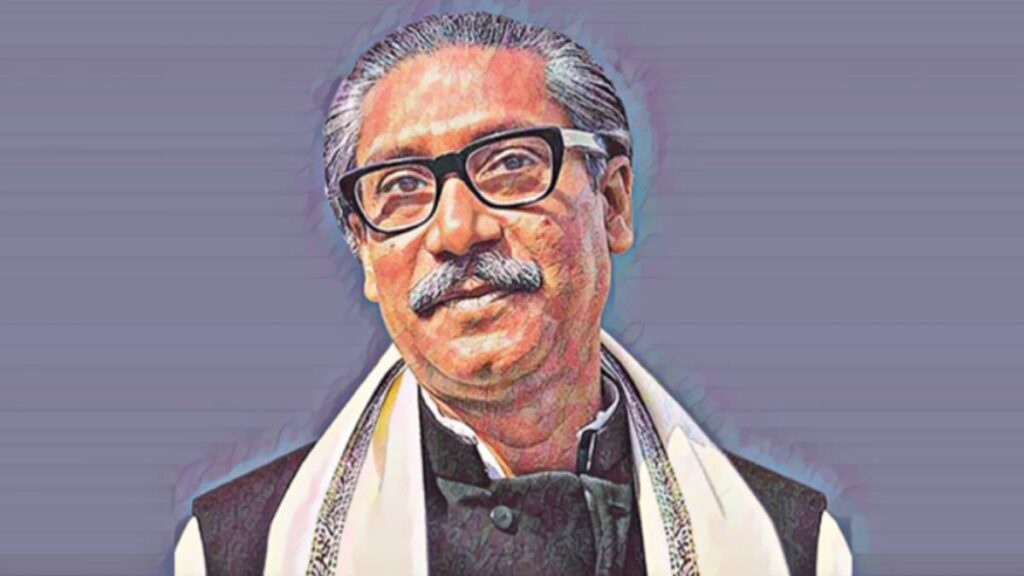Sheikh Mujibur Rahman (March 17, 1920 – August 15, 1975), affectionately known as Bangabandhu, is revered as the founding father of Bangladesh. His leadership and resolute commitment to the Bengali nation laid the groundwork for the country’s independence and its early political architecture.
Early Life & Education of Sheikh Mujibur Rahman
- Born: March 17, 1920, in Tungipara, Gopalganj (then British India)
- Family: Son of Sheikh Lutfar Rahman and Sheikh Sayera Khatun
- Education: Attended local schools and Missionary School in Gopalganj; later studied at Islamia College (now Maulana Azad College) and the University of Dhaka (law studies unfinished)
Political Journey & Imprisonments
- Early affiliation with All-India Muslim League; later emerged as a key founder of the Awami League in 1949
- He faced multiple imprisonments—13 years in total—under British and Pakistani rule due to his nationalist and democratic activism
- Spearheaded the Six-Point Movement in the 1960s calling for greater autonomy for Bengalis
Leadership & Bangladesh’s Liberation
- 1970: Awami League wins Pakistan’s first general election; Pakistan’s refusal to hand over power leads to rising tensions
- March 7, 1971: Delivers historic speech at Racecourse Ground, galvanizing the independence movement
- March 25, 1971: Arrested by Pakistani army at the onset of Operation Searchlight; later declared Bangladesh’s independence while imprisoned
- Became the symbolic head of the Provisional Government of Bangladesh, despite being behind bars

Political Career and Key Positions Held
| Year | Position / Responsibility | Role / Contribution |
|---|---|---|
| 1946–1948 | Adviser, Bengal Provincial Muslim League | Entry into provincial politics |
| 1948 | Role in founding the Chhatra League (Student League) | Leadership in student movement |
| 1953–1966 | General Secretary, Awami League | Strengthening the organization |
| 1954 | Minister of Agriculture, East Bengal | Agricultural reform initiatives |
| 1954–1958 | Member, East Pakistan Provincial Assembly | Representation of the people |
| 1955–1958 | Member, National Assembly of Pakistan | Participation in national politics |
| 1956–1957 | Minister of Industry, East Pakistan | Work in industrial development |
| 1966–1974 | President, Awami League | Leadership of the Six-Point Movement |
Statesman & Nation Builder
- 1971–1972: Served as the first President of Bangladesh
- 1972–1975: Became Prime Minister, leading efforts in reconstruction, constitution drafting, and governance reforms
- 1975: Assumed the presidency once more before his tragic assassination in August of that year
Literary Legacy
- The Unfinished Memoirs (অসমাপ্ত আত্মজীবনী): Written during imprisonment in the late 1960s, published in 2012 with translations in multiple languages
- The Prison Diaries (কারাগারের রোজনামচা): Jail diaries spanning 1966–1968, published in 2017 by Bangla Academy
Legacy & Memorial
- Assassination: Killed on August 15, 1975, in a military coup; only his daughters Sheikh Hasina and Sheikh Rehana survived as they were abroad
- His life story, ideology, and sacrifices remain integral to Bangladesh’s national identity
- Mausoleum: Located in his hometown of Tungipara, it houses a museum, library, ancestral home, and beautiful gardens—opened in 2001
See details click here
Conclusion
Bangabandhu Sheikh Mujibur Rahman was not only the founding father of Bangladesh but also the guiding force behind its struggle for freedom. His vision, courage, and unwavering dedication to the people of Bengal transformed the dream of independence into reality. He will forever live in the hearts of the Bangladeshi people as Bangabandhu – Friend of Bengal.
Discover information about historical places and figures on this website
